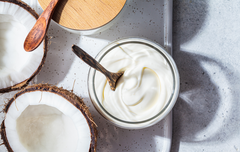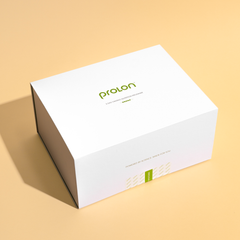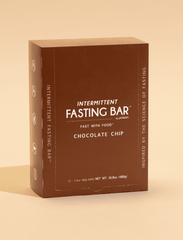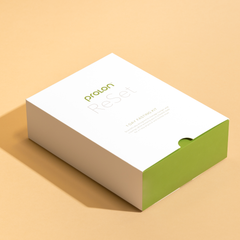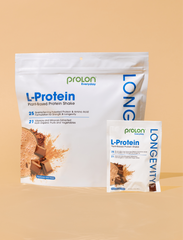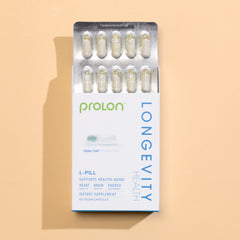
Longevity Diet: What Is It & What Are the Benefits?
Medically Reviewed by | Melinda Hany, Registered Nurse
If you’ve been searching for the fountain of youth, you may have just found it. And the good news: It’s within your grasp. The Longevity Diet, known for its ability to support a longer, healthier life, is thought to bolster your chances of living longer by strategically eating specific foods known to support longevity, avoiding others that don’t, and eating during specific periods of the day, called eating windows.
Together, we’ll discuss the unique components of the Longevity Diet, who it’s best for, and the benefits associated with it. We’ll also look at ways to support the body through fasting-mimicking technology, a key component of the Longevity Diet.
What Is the Longevity Diet?
The Longevity Diet was developed and coined by iconic longevity researcher Dr. Valter Longo. A scientist studying aging and longevity, he spent decades dissecting why/how some groups lived longer than others.
His research led to the discovery that across populations where people lived to be centenarians (age 100+), so-called “blue zones,” they ate certain foods and ate them in a specific pattern.
In 2018, he compiled his research and developed the Longevity Diet.
How Does the Longevity Diet Work?
The Longevity Diet works by focusing on certain foods while avoiding others. Contrary to what is popularly hailed as the “holy grail” of the macronutrient world, protein is actually a smaller part of the Longevity Diet — a shock to most people in our high-protein society. In fact, in his research, Dr. Longo discovered that a high protein diet (specifically from animal sources) was actually associated with the stimulation of growth hormone pathways TOR and IGF-1, which accelerates the aging process.
Curious about what’s inside the diet? Let’s look at it a little more closely.
What To Eat
The Longevity Diet focuses primarily on plant-based foods, which means the primary source of your nutrition will be from vegetables, whole grains, legumes, leafy greens, and beans. Fish is also consumed on the Longevity Diet, especially fatty fish which is lower in mercury.
It might sound a little scary to switch to a largely plant-based diet. Remember that it isn’t completely vegan, and there are allowances for some fish and certain quality dairy. Plant-based foods offer a variety of nutrients and options for satiety and satisfaction, making these foods obvious staples in all five of the known Blue Zones.
Most of your protein intake will come primarily from plant-based sources such as chickpeas, lentils, nuts, and beans. The diet also suggests using olive oil, a heart-healthy, monounsaturated oil for cooking.
What To Avoid
Due to animal protein’s effects on accelerating aging, the Longevity Diet encourages limiting red meat and poultry, opting instead for fish, which are especially fish high in heart-healthy Omega-3s. The diet is also low in and encourages a reduction in saturated fat, specifically from animal and vegetable sources. And just as importantly, the diet is very low in added sugar, a major culprit in the onset of chronic Western diseases like obesity, diabetes, heart disease, cancer, and more.
Additionally, to keep growth factors low between the ages of 18-65, the Longevity Diet recommends lowering your protein consumption to between 0.31 and 0.36 grams of protein per pound of body weight per day. For example, if you are a 150-pound person, your protein intake would range from 47g to 55g a day.
It’s important to keep in mind that the quality and nutrient value of the carbohydrate foods you’ll be consuming (legumes, lentils, whole grain, and fruit) are superior to the low-quality carb choices you may be most familiar with (like processed foods, snacks, and fried food).
Fasting Is Key
Fasting is essential to the Longevity Diet. This diet includes two types of fasting: Prolonged and intermittent.
Intermittent fasting, meaning any period of fasting that is 48 hours or less, can support longevity and metabolic function. However, prolonged fasting (>48 hours) is where you’re more likely to experience the benefits of autophagy, making it a recommended component of the Longevity Diet.
After a few days of prolonged fasting, our cells are triggered into the process of autophagy, which helps the body reuse and recycle worn-out cell parts. This places the cell in a period of stress, which then forces the cell to repair and rejuvenate, similar to how muscle fibers repair and rejuvenate after we lift weights.
Cellular rejuvenation supports healthy cellular function and functionality in the tissues, organs, and systems those cells interact with.
What Are the Potential Benefits of the Longevity Diet?
If your goal is to support overall health and a longer, healthier life, then the Longevity Diet is for you. The Longevity Diet has continually been associated with health benefits that support a life of vitality.
Supports Longevity
It’s one thing to live to an older age, and it’s a different thing to live longer in a healthy body. The goal is not just advancing the clock or the calendar by another year but rather supporting health and wellness as the years go by.
The Longevity Diet focuses on helping support the body in an effort to avoid age-related discomfort. Fasting for periods of time and consuming nutrient-rich foods both support cellular health, which is an essential component of living a long, healthy life.
Supports Overall Metabolic Health
Metabolic health, or your body’s ability to properly utilize energy from what you consume, is essential to a healthy life. As we age, the chances of developing metabolic syndrome rise. Metabolic syndrome is a cluster of illnesses that increase a person’s risk of having a cardiovascular event, and also increase the risk of other illnesses.
The illnesses that make up metabolic syndrome include:
- Insulin resistance
- BMI measures that are considered overweight and/or obese
- Unregulated blood pressure
- Unhealthy cholesterol levels
Certain amino acids may “speed up” the aging process, and the Longevity Diet consciously limits these types of amino acids in this diet.
Support Healthy Cardiovascular Function
It’s no secret that diet directly influences our cardiovascular health and plays a role in reducing or increasing our risk of developing cardiovascular complications. Processed meats, added sugar, and some saturated fats are all known to influence a person’s heart health negatively. “These foods can also increase cholesterol levels, adding an additional layer of risk,” notes Melinda Hany, Registered Nurse.
The Longevity Diet limits and/or completely eliminates these foods and focuses instead on heart-healthy foods like whole grains, plenty of vegetables, and omega-3-rich fish, all known to support heart health.
How Can Fasting Mimicking Diets Support the Longevity Diet?
The research behind the Longevity Diet is extensive. One of the most fascinating aspects of the diet is how it manipulates cellular function. Aging starts in our cells, and addressing aging at the cellular level is critical to accessing longevity.
Along with intermittent fasting, part of the Longevity Diet involves a process called Fasting Mimicking Diet (FMD). While most people who utilize fasting as part of their health and wellness routine either use intermittent fasting (which is also a key component of the daily longevity diet), the FMD is a five-day fast that “tricks” the body into thinking it is fasting while still giving it the precisely formulated nutrients to enhance the effects of water-only fasting.
FMD is ideal for those who are looking for the effects of prolonged fasting without the risk of losing muscle mass from the lack of food intake. This diet provides specific nutrients in specific amounts to keep you living below your nutrient-sensing pathways, or the radars in your body that signal the presence of food.
By living below your nutrient-sensing pathways during FMD, you can enjoy the benefits of fasting while consuming certain foods and nutrients.
How Does Nutrition Affect Your Lifespan?
You might not think that you have much control over your lifespan, but in terms of diet and exercise, there are fewer ways to support your ability to live longer and more healthfully. Choosing foods scientifically shown to support longer, healthier lives, as seen in the Longevity Diet, is key to using nutrition to better support metabolic and cellular health.
Fruits and vegetables are rich in certain vitamins and minerals that directly support immune function. Olive oil, another essential component of the diet mentioned earlier, contains monounsaturated fats and antioxidants, which can be linked to a healthy heart. Legumes, nuts, and seeds contain protein, which is essential to maintain muscle mass.
These nutrient components that make up foods recommended in the Longevity Diet are directly linked to our body’s functions, helping to support longevity.
If you are living with a diagnosed condition, it’s important to consult a healthcare provider to determine the best meal plan tailored to your individual needs. “It’s also crucial to verify that fasting is safe for you before attempting any fasting,” Hany notes. You may also consider discussing L-Nutra Health with your provider, who can work with you to get started with the FMD today.
The Bottom Line
A longer life and diet are intricately intertwined, and taking steps to improve your food choices can help support your wellness and your most important health markers. You have many dietary options to choose from, but the Longevity Diet is research-backed and currently surpassing other diets in terms of research and results.
Make the choice to support your longevity and your long-term health. The Longevity Diet is a sustainable diet that allows you the flexibility of eating primarily plant-based (with some pescatarian additions) and also allows your body to enjoy the benefits of periodic fasting.
For more ways to support your body through the longevity diet and the FMD, Prolon is your go-to source for resources and plans to help support and nourish your body.
Sources:
Daily Longevity Diet for Adults | Valter Longo
The GH/IGF-1 axis in ageing and longevity | PMC
Nutrition, longevity and disease: From molecular mechanisms to interventions | PubMed
Efficacy of Dietary Behavior Modification for Preserving Cardiovascular Health and Longevity | PMC






